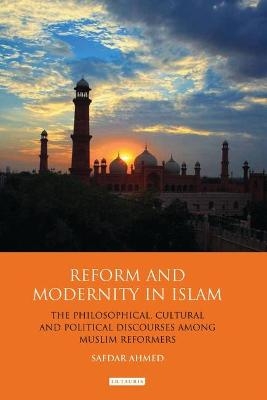
Reform and Modernity in Islam
The Philosophical, Cultural and Political Discourses Among Muslim Reformers
Seiten
2013
Tauris Academic Studies (Verlag)
978-1-84885-735-3 (ISBN)
Tauris Academic Studies (Verlag)
978-1-84885-735-3 (ISBN)
The debate over Islam and modernity is approached from a Eurocentric perspective that presents Western norms as a template for progress. This misses the development of Muslim reformist thought that actively engages with the world around it and seeks to reconfigure Islam within the diverse conditions of modernity.
The debate over Islam and modernity tends to be approached from a Eurocentric perspective that presents Western norms as a template for progress - against which Islamic societies can be measured. This misses the historical development of Muslim reformist thought that actively engages with the world around it and seeks to reconfigure Islam within the diverse conditions of modernity. Safdar Ahmed paints a complex and nuanced picture that goes beyond the idea that Muslim reformers have either reproduced or reacted against Western ideas. Rather, Ahmed argues, they have reconstructed and appropriated these ideas, and so the thread of Western influence runs through modern Islamic thought on nationalism and sovereignty, femininity and gender. Ahmed uncovers new historiographical perspectives by critically examining the work of prominent intellectuals, such as Muhammad Abduh, Qasim Amin and Abdul A'la Maududi.
The debate over Islam and modernity tends to be approached from a Eurocentric perspective that presents Western norms as a template for progress - against which Islamic societies can be measured. This misses the historical development of Muslim reformist thought that actively engages with the world around it and seeks to reconfigure Islam within the diverse conditions of modernity. Safdar Ahmed paints a complex and nuanced picture that goes beyond the idea that Muslim reformers have either reproduced or reacted against Western ideas. Rather, Ahmed argues, they have reconstructed and appropriated these ideas, and so the thread of Western influence runs through modern Islamic thought on nationalism and sovereignty, femininity and gender. Ahmed uncovers new historiographical perspectives by critically examining the work of prominent intellectuals, such as Muhammad Abduh, Qasim Amin and Abdul A'la Maududi.
Safdar Ahmed is a lecturer and tutor in the Department of Islamic and Arabic Studies at the University of Sydney, where he also obtained his PhD.
Chapter 1: Islamic Modernism and the Reification of Religion
Chapter 2: Literary Romanticism and Islamic Modernity: The Case of Urdu Poetry
Chapter 3: Education and the Status of Women
Chapter 4: Muhammad Iqbal, Islam and Modern Nationalism
Chapter 5: The Theory of Divine Sovereignty
Chapter 6: Maududi and Gendering of Muslim Identity
Chapter 7: Progressive Islam: The Hermeneutical Turn
Conclusion
| Erscheint lt. Verlag | 28.5.2013 |
|---|---|
| Sprache | englisch |
| Maße | 138 x 216 mm |
| Gewicht | 519 g |
| Themenwelt | Sozialwissenschaften ► Politik / Verwaltung |
| Sozialwissenschaften ► Soziologie ► Spezielle Soziologien | |
| ISBN-10 | 1-84885-735-7 / 1848857357 |
| ISBN-13 | 978-1-84885-735-3 / 9781848857353 |
| Zustand | Neuware |
| Haben Sie eine Frage zum Produkt? |
Mehr entdecken
aus dem Bereich
aus dem Bereich
eine Einführung
Buch | Softcover (2024)
De Gruyter Oldenbourg (Verlag)
CHF 41,90


